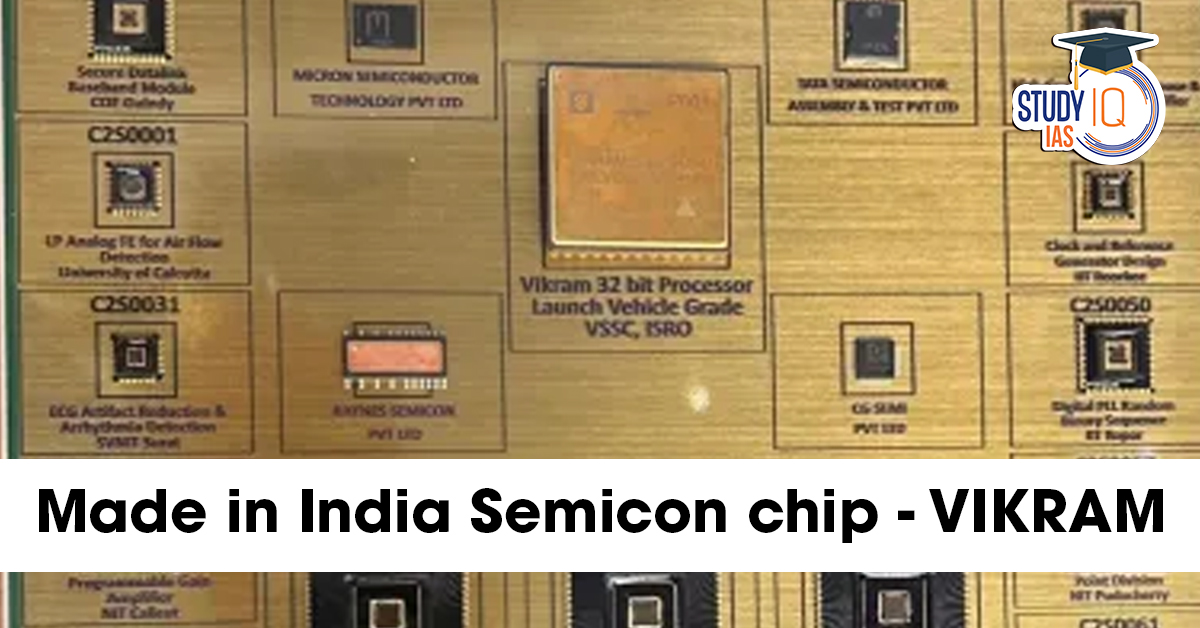Table of Contents
India achieved a historic milestone in its semiconductor journey with the unveiling of VIKRAM 3201, the nation’s first fully indigenous 32-bit space-grade microprocessor, at Semicon India 2025. The chip, developed by the Vikram Sarabhai Space Centre (VSSC) of ISRO and fabricated at ISRO’s Semiconductor Laboratory (SCL), Chandigarh, marks a new era of Atmanirbhar Bharat in microelectronics.
Union IT Minister Ashwini Vaishnaw presented the chip to Prime Minister Narendra Modi, highlighting India’s leap towards self-reliance in the semiconductor and space technology sector.
What is VIKRAM 3201?
-
Type: First fully indigenous 32-bit microprocessor from India
-
Developer: Vikram Sarabhai Space Centre (VSSC), ISRO
-
Fabrication: Semiconductor Laboratory (SCL), Chandigarh
-
Technology: Built on a 180 nm CMOS process
-
Purpose: Designed to withstand harsh space environments—radiation, temperature extremes, and vibrations of launch vehicles.
-
Successor to: The 16-bit VIKRAM 1601 microprocessor, which has been in use in ISRO’s launch vehicle avionics since 2009.
| SEMICON India 2025 |
| News? The SEMICON India 2025 concluded in New Delhi.
Key Highlights
|
Key Features of VIKRAM 3201
-
Indigenous Design – Entirely conceptualised and designed in India, reducing dependence on foreign space-grade processors.
-
Radiation Hardened – Can operate in extreme cosmic radiation, crucial for launch vehicles and satellites.
-
Wide Temperature Range – Functional from –55°C to +125°C.
-
Custom Instruction Set – Optimised for ISRO’s needs, supporting Ada programming language, with a C compiler under development.
-
High Performance – Enables real-time navigation, control, and guidance systems.
-
Toolchain Developed by ISRO – Includes assembler, linker, simulator, and IDE, ensuring complete independence from foreign software ecosystems.
-
Flight Proven – Successfully tested onboard PSLV-C60 mission’s POEM-4 platform.
Applications of VIKRAM 3201
-
Launch Vehicles: For avionics, navigation, and control systems.
-
Satellites: Can be extended for satellite payloads and communication systems.
-
Defence: Offers indigenous solutions for critical defence technologies.
-
Automotive & Power Systems: Potential applications in electric vehicles and smart grids.
-
Industrial Use: Suitable for sectors requiring reliable, high-performance chips in harsh conditions.
Strategic Importance of VIKRAM 3201
-
Self-Reliance in Semiconductors: A major boost to the Semiconductor Mission of India, ensuring reduced dependence on imports.
-
Space Technology Leadership: Positions India among the few countries capable of developing space-grade processors like the U.S. RAD750 or Europe’s LEON processors.
-
National Security: Indigenous chips reduce the risk of supply-chain vulnerabilities in defense and space missions.
-
Boost to Semiconductor Ecosystem: Encourages R&D, fabrication, and talent development in India’s semiconductor industry.
-
Global Competitiveness: Enhances India’s profile as a reliable technology hub for advanced electronics.
VIKRAM 3201 vs Global Space-Grade Chips
-
U.S. RAD750: Widely used but expensive, relies on foreign supply chains.
-
Europe’s LEON: Open-source but dependent on ESA’s ecosystem.
-
India’s VIKRAM 3201: 100% designed and fabricated in India, cost-effective, and tailored for ISRO’s missions.
Why VIKRAM 3201 is a Game-Changer for India
The unveiling of VIKRAM 3201 is more than just a technological advancement—it is a symbol of India’s semiconductor self-reliance. With global semiconductor supply chains under strain and growing geopolitical tensions, India’s ability to develop indigenous microprocessors will safeguard national interests while fueling innovation in critical sectors.
Prime Minister Narendra Modi hailed the achievement as a “trust in India’s capability to design, make, and innovate for the world.” This aligns with the Digital India and Make in India missions, propelling the country toward becoming a global semiconductor hub.
Conclusion
The VIKRAM 3201 microprocessor is a landmark achievement for India’s semiconductor ecosystem. As the first Made-in-India 32-bit microprocessor, it not only strengthens ISRO’s space missions but also lays the foundation for India’s semiconductor self-reliance.
With its proven performance in space conditions and potential applications across industries, VIKRAM 3201 is set to accelerate India’s journey toward becoming a global leader in advanced chip design and manufacturing.


 Advanced Air Defence Radars: Types, Comp...
Advanced Air Defence Radars: Types, Comp...
 Ion Chromatography, Working and Applicat...
Ion Chromatography, Working and Applicat...
 Broadly Neutralising Antibodies (bNAbs):...
Broadly Neutralising Antibodies (bNAbs):...

























